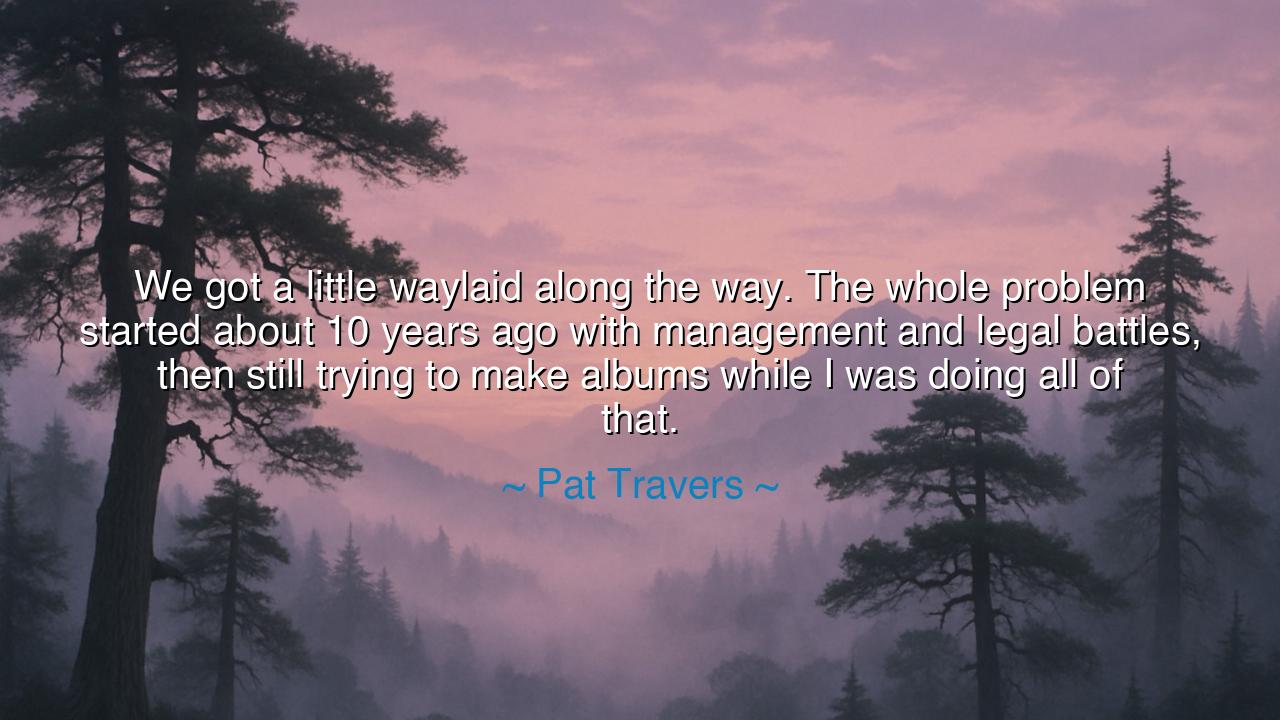
We got a little waylaid along the way. The whole problem started
We got a little waylaid along the way. The whole problem started about 10 years ago with management and legal battles, then still trying to make albums while I was doing all of that.






When Pat Travers reflected, “We got a little waylaid along the way. The whole problem started about 10 years ago with management and legal battles, then still trying to make albums while I was doing all of that,” he spoke not merely of a musician’s hardship, but of the universal struggle of creation amid conflict. His words carry the weary wisdom of an artist who has battled forces beyond his control — legal entanglements, management disputes, and the suffocating weight of distraction that pulls one’s spirit from its true calling. Travers’ statement is a confession, but also a testament: that even the most gifted among us can be diverted from their purpose, not by lack of talent, but by the snares of the world that rise between art and freedom.
The origin of this quote lies in Travers’ reflections on his career as a rock musician — a journey that began with fire and promise in the 1970s, when his blistering guitar work and unyielding energy won him acclaim. Yet as years passed, the pure joy of creation was darkened by the storm of industry politics and legal struggles. Record labels, managers, and contracts — the machinery of fame — often consumed more of his energy than the music itself. In these few words, Travers revealed the tragedy that haunts not only musicians, but all who strive to build something beautiful in a world governed by profit, paperwork, and power. His statement is both lament and lesson: that when art becomes tangled in the snares of law and management, the soul of the creator can lose its way.
His words call to mind the tale of Michelangelo, the sculptor of divine visions, who in his time was bound by contracts, patrons, and politics as fierce as any modern legal battle. When commissioned to paint the Sistine Chapel, he was beset by rival artists, jealous clergy, and the unrelenting demands of Pope Julius II — a man as mercurial as any record executive. Michelangelo’s letters speak of exhaustion and frustration: “I am not in the right place. I am not a painter.” Yet, through all this turmoil, he created one of the greatest works of art in human history. Travers’ lament, centuries later, reflects that same truth — that the artist’s road is rarely clear, and the very institutions meant to elevate him often become the obstacles he must overcome.
In saying, “We got a little waylaid along the way,” Travers speaks to every soul who has known distraction from destiny. The phrase is soft in tone, yet heavy in meaning. To be “waylaid” is not to be defeated, but delayed — pulled from one’s path by forces unseen. Life, he reminds us, is not only about talent or ambition; it is about endurance through the detours. The management and legal battles he mentions symbolize the external noise that drowns the inner music — the endless bureaucracy and conflict that stifle the spark of creation. Many great figures in history — from Galileo, silenced by authority, to Van Gogh, tormented by neglect — have faced this same diversion. Travers’ humility in admitting this struggle gives his words their power, for he speaks the truth of all who create in a world that does not understand creation.
And yet, within his lament lies resilience. Even as he recalls years spent entangled in strife, Travers notes that he kept “trying to make albums while I was doing all of that.” This is the spirit of perseverance that distinguishes the true artist from the dreamer. Though surrounded by storms, he did not abandon his craft. The guitar, for him, remained a compass through confusion — a reminder that art can still rise above disorder. His words echo like an ancient proverb: Though the world delays the artist, it cannot silence his song.
There is a deeper lesson here for all generations. Every person who seeks to bring beauty, justice, or meaning into the world will face distractions — legal, financial, or personal. These are not signs of failure, but of humanity’s struggle between the sacred and the mundane. Travers’ story teaches us to protect the flame of purpose, to guard it against the winds of distraction. The artist’s path, the scholar’s path, the dreamer’s path — all demand not only skill, but endurance.
Let his words be remembered, then, as both warning and encouragement: beware of the traps that success lays before the soul. For the world will always offer gold in exchange for time, comfort in exchange for purpose, and compromise in exchange for peace. Resist these with courage. Stay faithful to the work that speaks through you, even when the noise of life threatens to drown it out.
And so, the teaching of Pat Travers endures — that even when you are waylaid along the way, the road remains yours to walk. Return to your art, your calling, your truth, no matter how many battles delay you. For though the world may bind your hands with contracts and cares, it can never chain the spirit that still burns within — the spirit that remembers why it began to create at all.






AAdministratorAdministrator
Welcome, honored guests. Please leave a comment, we will respond soon